
Find Help
More Items From Ergsy search
-
How does motor neurone disease affect speech?
Relevance: 100%
-
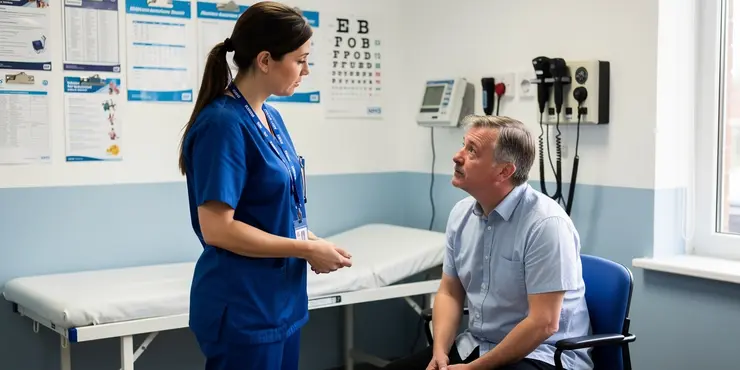
What is motor neurone disease?
Relevance: 93%
-
Are there different types of motor neurone disease?
Relevance: 89%
-
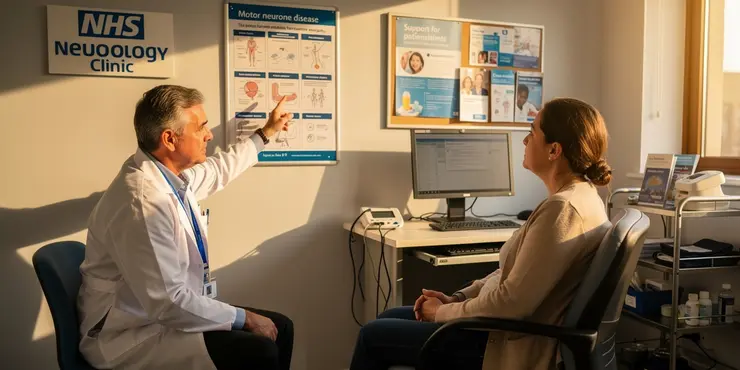
Is there a cure for motor neurone disease?
Relevance: 85%
-

What are the primary symptoms of motor neurone disease?
Relevance: 84%
-
Is motor neurone disease hereditary?
Relevance: 83%
-

What treatments are available for motor neurone disease?
Relevance: 82%
-

What causes motor neurone disease?
Relevance: 80%
-
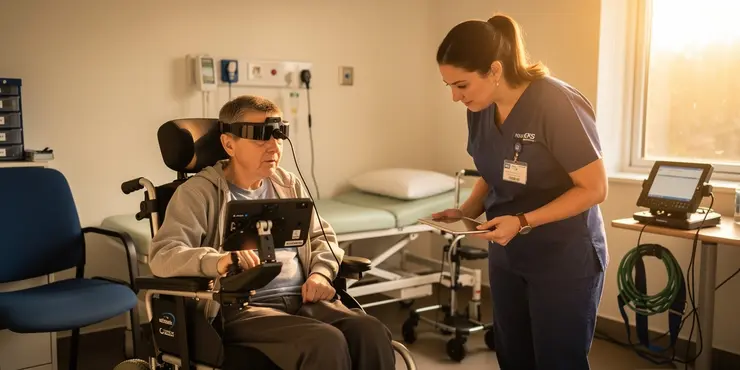
What assistive devices can help people with motor neurone disease?
Relevance: 78%
-
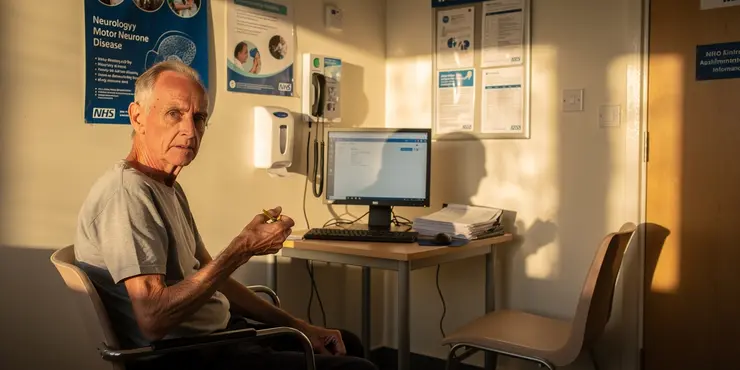
How does motor neurone disease affect the body?
Relevance: 77%
-

Motor neurone disease Julie's story | NHS
Relevance: 75%
-
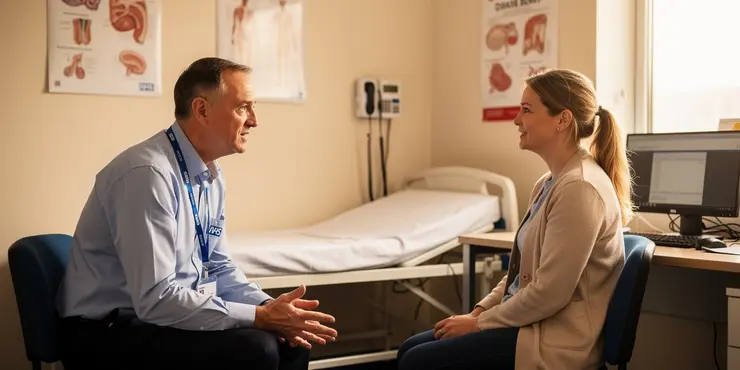
How is motor neurone disease diagnosed?
Relevance: 74%
-

How does motor neurone disease impact swallowing?
Relevance: 73%
-

Voice banking service helps people live with motor neurone disease
Relevance: 72%
-

How is breathing affected by motor neurone disease?
Relevance: 72%
-
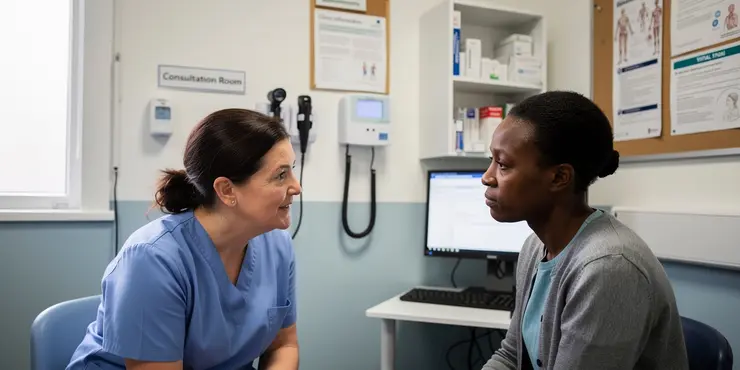
What is the life expectancy after a motor neurone disease diagnosis?
Relevance: 70%
-

What role do genetics play in motor neurone disease?
Relevance: 70%
-
Can lifestyle changes impact motor neurone disease progression?
Relevance: 67%
-

How can caregivers support someone with motor neurone disease?
Relevance: 62%
-

Are there support groups for individuals with motor neurone disease?
Relevance: 54%
-
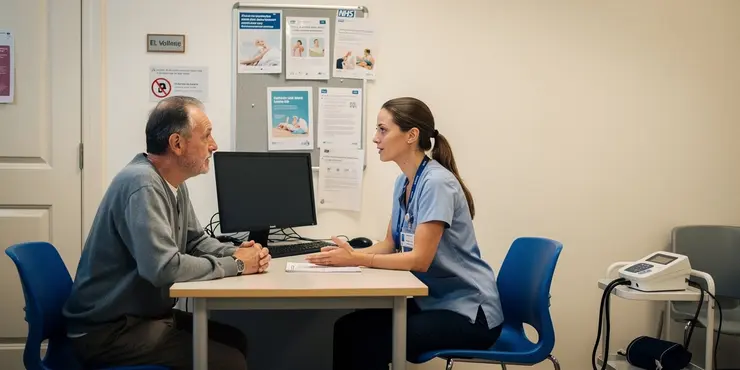
Who is at risk for motor neurone disease?
Relevance: 53%
-
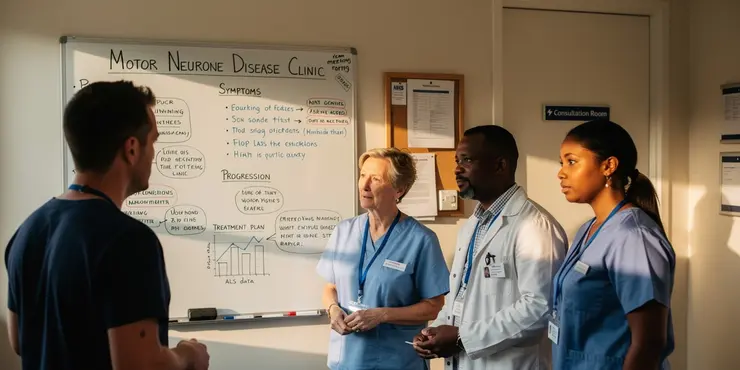
What research is being done on motor neurone disease?
Relevance: 52%
-

Stroke - Speech and Language Therapist's Experience
Relevance: 39%
-

What is MND?
Relevance: 39%
-
How does Huntington's disease affect movement?
Relevance: 36%
-
What is Parkinson's disease?
Relevance: 35%
-
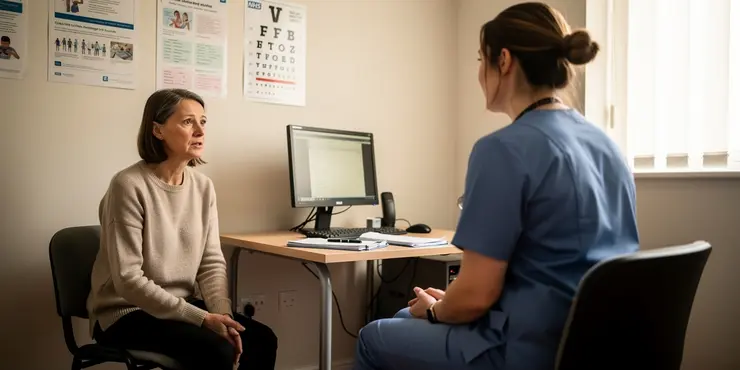
What are the symptoms of Huntington's disease?
Relevance: 33%
-
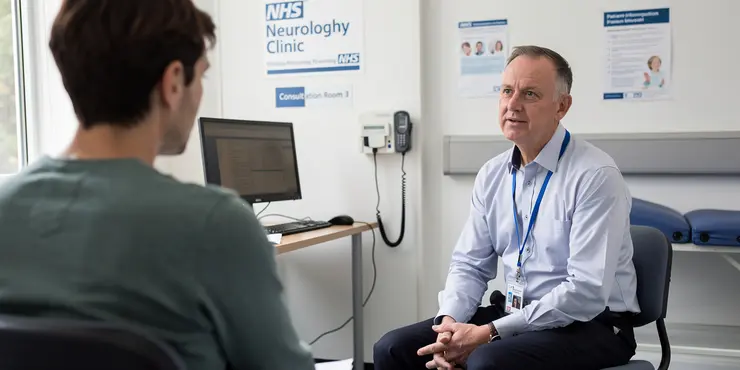
What kinds of specialists are involved in treating Huntington's disease?
Relevance: 32%
-

Is Huntington's disease fatal?
Relevance: 30%
-
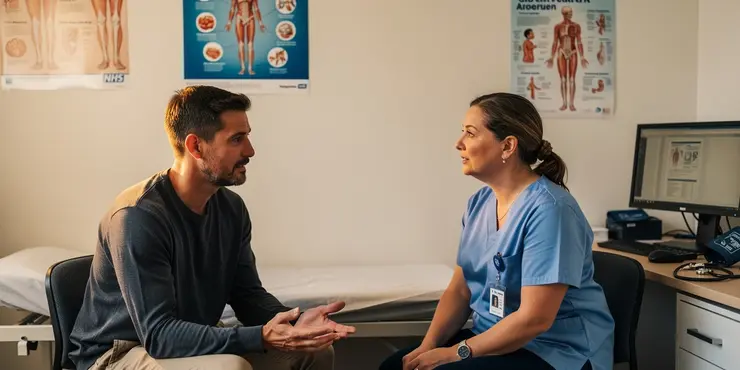
What causes Huntington's disease?
Relevance: 29%
-
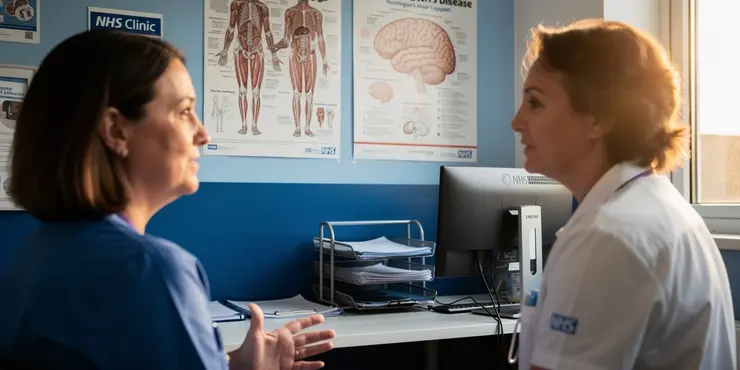
What is Huntington's disease?
Relevance: 28%
-
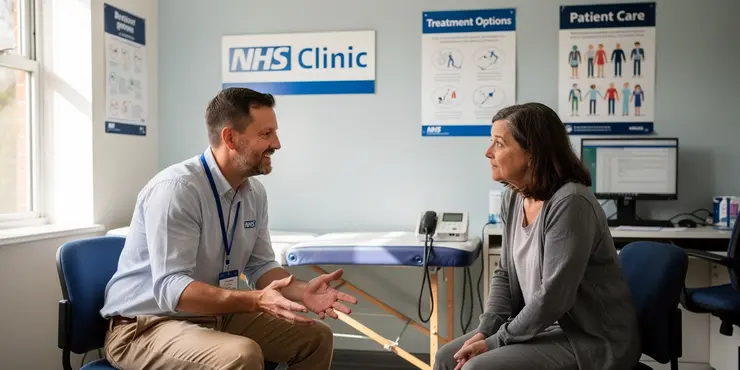
What research is being done on Huntington's disease?
Relevance: 26%
-

Can Huntington's disease be prevented?
Relevance: 25%
-

What causes Alzheimer's disease?
Relevance: 24%
-

Parkinson’s Disease and NHS RightCare: Long Term Condition Scenario
Relevance: 22%
-

Can Huntington's disease be cured?
Relevance: 22%
-
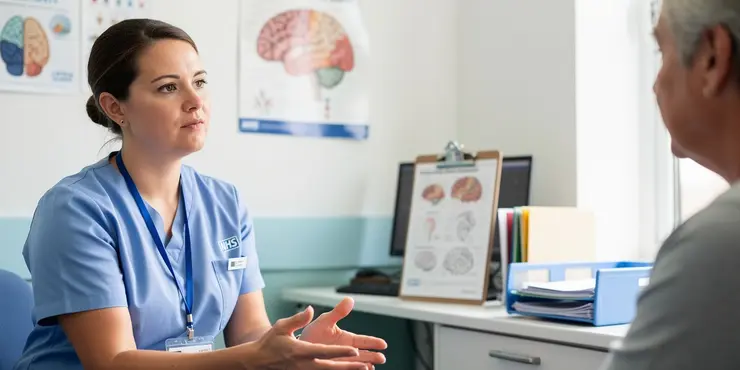
An introduction to frontotemporal dementia (FTD) (part 1/3)
Relevance: 21%
-

What are the symptoms of Alzheimer's disease?
Relevance: 21%
-

How is Huntington's disease diagnosed?
Relevance: 21%
-

How does Huntington's disease affect emotions?
Relevance: 20%
Introduction to Motor Neurone Disease
Motor neurone disease (MND) is a progressive neurological condition that affects the nerves in the brain and spinal cord, causing muscle weakness. In the UK, it's known as amyotrophic lateral sclerosis (ALS) and is characterized by its impact on day-to-day functionalities, including speech. As nerve cells deteriorate, communication can become increasingly difficult.
How MND Affects Speech
The muscles involved in speaking are controlled by motor neurons, and as MND progresses, these neurons deteriorate. This affects speech clarity and volume, making communication challenging. The specific impact on speech depends on which area of the brain and muscles are affected first. For some, changes in speech may be the first sign of MND.
Dysarthria in MND
A common speech issue caused by MND is dysarthria, a motor speech disorder resulting from impaired movement of the muscles used for speaking. Symptoms include slurred or slow speech, changes in voice quality such as hoarseness or breathiness, and difficulties in articulation. This can make it hard to pronounce words clearly, leading to misunderstandings or the need for the speaker to repeat themselves.
Stages of Speech Decline
In the early stages of MND, speech may be slightly slurred or nasal-sounding. Over time, as the disease progresses, speech can become more significantly affected. The ability to form sounds can diminish, and speech may become increasingly difficult to understand. Eventually, some individuals may lose the ability to speak altogether.
Communication Aids and Strategies
As speech difficulties progress, individuals with MND may benefit from communication aids. Low-tech options include using notebooks or alphabet boards, while high-tech solutions can include speech-generating devices. These tools can help maintain a form of communication, allowing individuals to express their needs and participate in conversations for as long as possible.
Speech Therapy and Support
Speech and language therapy can be beneficial for those with MND. Therapists work to help individuals maintain their speech for as long as possible and introduce strategies to make communication easier. Techniques may include breath control exercises, improving articulation with exercises, and learning to project the voice. Speech therapists also assist in finding the most suitable communication aids.
Conclusion
Motor neurone disease significantly affects speech, with the extent and progression varying from person to person. Despite the challenges, working with healthcare providers to explore therapies and communication tools can help individuals maintain a degree of autonomy in their communication. The focus remains on preserving quality of life and enabling connection with others.
Introduction to Motor Neurone Disease
Motor neurone disease (MND) is a sickness that gets worse over time. It affects the nerves in the brain and spine. This makes muscles weak. In the UK, it is also called amyotrophic lateral sclerosis (ALS). MND makes everyday things, like talking, harder to do. As nerves get worse, it becomes more difficult to talk.
How MND Affects Speech
The muscles we use to talk are controlled by motor neurons. When someone has MND, these neurons get worse. This makes talking hard. You may find it hard to speak clearly or loudly. The changes depend on which part of the brain or muscles are affected first. For some people, talking problems may be the first sign of MND.
Dysarthria in MND
Dysarthria is a common speech problem caused by MND. It happens when the muscles used for talking do not move well. This can make speech slurred or slow. Voices might sound different, like hoarse or breathy. Speaking clearly can become difficult, leading to misunderstandings. People might need to repeat themselves a lot.
Stages of Speech Decline
At first, speech might be a bit unclear or sound like it's coming from the nose. As MND gets worse, talking becomes harder. Making sounds can become very difficult, and speech might be hard to understand. Some people may eventually not be able to talk at all.
Communication Aids and Strategies
As talking becomes harder, people with MND can use other ways to communicate. Simple ways include writing in a notebook or using an alphabet board. There are also special machines that can help speak for them. These tools help people talk to others and say what they need.
Speech Therapy and Support
Speech and language therapy can help people with MND. Therapists help keep speech going for as long as possible. They teach ways to make talking easier, like breath control and exercises to improve sound. They also help find the best communication tools to use.
Conclusion
Motor neurone disease affects talking a lot, and it gets worse over time. Everyone is affected differently. Healthcare teams can help with therapy and tools. These help people with MND keep talking and stay connected to others. The goal is to keep their life as good as possible.
Frequently Asked Questions
What is motor neurone disease?
Motor neurone disease (MND) is a progressive neurological condition that affects the motor neurons, leading to muscle weakness and degeneration.
How does motor neurone disease affect speech?
MND can affect speech by causing weakness or paralysis of the muscles involved in speaking, making it difficult to articulate words.
Which muscles are involved in speech and are affected by MND?
MND can affect the tongue, lips, vocal cords, and the muscles involved in breathing, which are all critical for articulate speech.
What are the initial speech symptoms of MND?
Early signs may include slurred speech, a change in voice tone, and difficulty pronouncing words.
Can MND lead to a complete loss of speech?
In advanced stages, MND can lead to complete loss of speech as muscle control is further compromised.
Do all patients with MND experience speech problems?
Not all MND patients experience speech problems, but it is a common symptom, particularly in conditions like bulbar onset MND.
What is bulbar onset MND?
Bulbar onset MND affects the brainstem, leading to early symptoms related to speech and swallowing difficulties.
How does MND affect the clarity of speech?
MND can make speech sound slurred, unclear, and slow due to weakened and uncoordinated speech muscles.
Can speech therapy help MND patients?
Speech therapy can help MND patients manage and maintain their speech for as long as possible through exercises and techniques.
Are there technological aids available to assist speech in MND patients?
Yes, assistive technology like speech-generating devices and computer-based communication aids can help patients communicate.
Can breathing difficulties exacerbate speech problems in MND?
Yes, weakened respiratory muscles can affect speech volume and make speaking more tiring and difficult.
What is dysarthria and how is it related to MND?
Dysarthria is a condition marked by unclear articulation of speech due to muscular control loss, which is common in MND.
How can family and caregivers support MND patients with speech issues?
Family and caregivers can support by being patient, using alternative communication methods, and encouraging the use of assistive devices.
What role does emotional support play in managing speech issues in MND?
Emotional support is crucial as speech difficulties can lead to frustration and social isolation; encouragement helps maintain mental health.
Can MND patients retain their natural voice?
While voice changes are common, some patients may retain natural voice qualities depending on which muscles and nerves are affected and to what extent.
Is there a way to predict how quickly MND will affect speech?
The progression of speech difficulties varies greatly among individuals, and it is challenging to predict specific timelines.
Are there strategies to improve communication for MND patients?
Yes, strategies include simplifying conversation, using gestures, and planning alternative methods like writing or text-to-speech devices.
How does progressive bulbar palsy relate to speech problems in MND?
Progressive bulbar palsy is a form of MND that primarily affects speech and swallowing due to brainstem involvement.
What impact does MND have on social interaction?
Speech difficulties can significantly impact social interactions, leading to isolation and changes in personal relationships.
Can swallowing difficulties affect speech in MND?
Yes, swallowing and speech muscles are often the same, so difficulties in swallowing can indicate or exacerbate speech problems.
What is motor neurone disease?
Motor neurone disease (MND) is an illness. It makes the nerves in the body stop working. These nerves help muscles move. When they stop working, it is hard to walk, talk, eat, and breathe.
Here are some ways to help understand better:
- Use pictures to see how it affects people.
- Ask someone to explain it to you with simple words.
- Watch videos made for children to learn more.
Motor neurone disease (we call it MND) is an illness that gets worse over time. It hurts the nerves that control muscles. This makes muscles weak and damaged.
How does motor neurone disease affect speech?
Motor neurone disease (MND) is an illness that can make talking hard. It affects the nerves that help us move and speak.
Here is what can happen:
- Words might come out slowly or sound different.
- The voice might get quieter.
- It might get hard to pronounce words clearly.
To help communicate, people might try:
- Writing things down.
- Using picture cards.
- Using devices that speak for them.
Having a speech therapist can also be really helpful.
MND can make it hard to talk. It can make the muscles used for talking weak or stop working. This makes saying words tricky.
What muscles help us talk and can be affected by MND?
Muscles help us move our mouth, tongue, and throat to speak. MND can make these muscles weak.
Let's understand together.
- Mouth Muscles: Help us move lips for sounds.
- Tongue Muscles: Help us say words clearly.
- Throat Muscles: Help us make sounds.
If someone has trouble talking, pictures or special tools can help. A speech therapist can also help practice talking.
MND can make it hard to talk because it can make your tongue, lips, and vocal cords weak. It can also make it harder to breathe, and all these things are important for speaking clearly.
What are the first speech signs of MND?
MND stands for Motor Neurone Disease. It is a sickness that affects nerves in the brain and spine. This can change how muscles work.
Here are some first signs of MND that can affect speech:
- You might find it hard to talk clearly.
- Words can sound slurred, like when you are very tired.
- Your voice might become softer or change how it sounds.
- It can be tough to move your mouth or tongue well.
Ways to get help:
- See a doctor or speech therapist for advice.
- Use picture boards or apps to help with talking.
- Practice exercises to strengthen mouth and voice muscles.
First signs might be:
- Talking in a way that is hard to understand
- Voice sounding different
- Having trouble saying words correctly
If you notice these signs, it might help to:
- Ask someone to help you talk
- Use a talking app on a tablet or phone
- Speak slowly and carefully
Can MND stop someone from talking?
When MND gets worse, it can make talking very hard because the muscles stop working well.
Do people with MND have trouble talking?
MND can make it hard to talk. Not everyone with MND will have this problem, but many do. Talking can get slower or harder to understand.
If talking is difficult, you can:
- Try writing or drawing.
- Use a computer or tablet to help you communicate.
- Ask someone to help you with speaking.
If you need more support, talk to a doctor or speech therapist.
Not everyone with MND has trouble speaking, but it happens a lot, especially if you have a type called bulbar onset MND.
What is bulbar onset MND?
Bulbar onset MND is a type of illness. It affects the muscles you use to talk, swallow, and breathe. MND stands for Motor Neurone Disease. This illness can make it hard to speak or eat. It happens because the nerves that control these muscles stop working properly.
If you want to learn more, you can:
- Ask a doctor or nurse for help.
- Look at pictures or diagrams to understand better.
- Use a voice-to-text tool to help with reading.
Bulbar onset MND is a condition that affects the brainstem. This part of the brain is important for talking and swallowing. So, people with this condition might have trouble speaking and eating.
How does MND change the way people talk?
MND can make it hard for people to talk clearly. The muscles used for talking might get weak. This can make words sound different.
Things that can help:
- Speech therapy: A therapist can help with talking skills.
- Using pictures or a computer to talk.
- Taking time to speak slowly.
- Practicing with friends or family.
MND can make talking hard. Words can sound mixed up and slow. This happens because the muscles used to talk become weak and do not work together well.
Can speech therapy help people with MND?
MND is a sickness called Motor Neurone Disease. It can make talking hard. Speech therapy can help. A speech therapist is a person who helps people talk better.
If you have MND, speech therapy can teach you new ways to talk. You can also learn to use special tools to speak. These tools can be pictures or computer devices that talk for you.
Speech therapy can help make talking easier for people with MND.
Speech therapy can help people with MND. It can help them talk better for longer. They do this with special exercises and activities.
Can technology help people with MND talk?
People with MND might have trouble talking. There are helpful tools that can make it easier for them to speak. These are called communication aids. Here are some examples:
- Speech Apps: These are apps on phones or tablets that can speak for you. You type words, and the app says them out loud.
- Voice Amplifiers: These make your voice louder so people can hear you better.
- Eye-Tracking Devices: You can use your eyes to choose words on a screen, and the device will speak the words.
If you or someone you know has MND, talk to a doctor or therapist. They can help you find the right tools.
Yes, special tools can help people talk. Some tools can speak for them, and others use a computer to help them say what they want.
Can breathing problems make talking harder for people with MND?
Yes, weak breathing muscles can make it hard to talk loudly. It can also make talking feel tiring and difficult.
What is dysarthria and how is it related to MND?
Dysarthria is a problem with speaking clearly. It happens when the muscles we use for speaking are weak or hard to control.
MND, or Motor Neurone Disease, can cause dysarthria. MND affects the nerves in the brain and spine that help muscles move. This can make it hard to talk.
If you have trouble speaking, you might find it helpful to use tools like picture cards or a communication device. You can also ask others to be patient and give you time to express yourself.
Dysarthria happens when it's hard to speak clearly because the muscles that help us talk are not working well. People with a condition called MND often have this problem.
How can family and caregivers help people with MND who have trouble talking?
Family and caregivers can help people with MND by using simple language, speaking slowly, and listening carefully. They can also use pictures, gestures, or writing to communicate. Devices that help with talking, like speech apps, can be useful too. It's important to be patient and give the person time to express themselves. Encouraging communication in different ways can make it easier for everyone.
Families and caregivers can help by being patient. They can use different ways to talk and help use special tools.
How can helping with feelings help people talk better with MND?
Emotions are our feelings, like being happy or sad. MND is a sickness that can make talking hard. Getting help with feelings can make talking easier for people with MND. Talking with family and friends about how you feel can help. Doing fun things and staying calm can make people feel better. Sometimes, using writing or pictures can help with talking. Special teachers or counselors can help by listening and giving advice. It is important to have people who care and listen.It’s important to feel supported when you have trouble speaking. This is because it can make you feel upset or lonely. Having people who cheer you on can help you feel happy and healthy.
Can people with MND keep their own voice?
MND means motor neurone disease. It can make it hard to talk.
Some people with MND can keep using their voice. Others might need help. Voice banking helps save your voice. A computer can speak in your voice.
If you have MND, talk to your doctor. They can help you find the best tools.
People's voices often change. Some people might keep their usual voice. This depends on which muscles and nerves were affected and how much they were affected.
Can we tell how fast MND will change speech?
Speech problems can be different for each person. It is hard to know how long they will last or when they will change.
How can we help people with MND to talk better?
Here are some ways to help:
- Use pictures or drawings to talk.
- Try a communication board or app.
- Give the person more time to talk.
- Use simple words and short sentences.
- Try to speak clearly and slowly.
These ways can help people with MND share their thoughts and feelings.
Yes, there are ways to help. You can make talking simpler, use hand signals, and think of other ways to chat like writing or using devices that turn text into speech.
Why does progressive bulbar palsy cause speech problems in MND?
Progressive bulbar palsy is a type of illness that makes talking and swallowing hard. It happens because a part of the brain called the brainstem is affected.
How does MND affect talking and being with people?
Problems with speaking can make it hard to talk to others. This can make someone feel alone and can change their friendships.
Can having trouble swallowing change the way you talk with MND?
MND stands for motor neurone disease. It is a health problem that affects nerves in your body.
If you have trouble swallowing, it might change how you talk. This is because the same muscles help you swallow and speak.
Ask a doctor if you think your swallowing or speaking is different. They can give you advice and ways to help.
Helpful tools like speech boards or apps can make talking easier.
Yes, the muscles we use to swallow and speak are often the same. This means if you have trouble swallowing, it might cause problems with speaking too.
Useful Links
This website offers general information and is not a substitute for professional advice.
Always seek guidance from qualified professionals.
If you have any medical concerns or need urgent help, contact a healthcare professional or emergency services immediately.
Some of this content was generated with AI assistance. We’ve done our best to keep it accurate, helpful, and human-friendly.
- Ergsy carfully checks the information in the videos we provide here.
- Videos shown by Youtube after a video has completed, have NOT been reviewed by ERGSY.
- To view, click the arrow in centre of video.
- Most of the videos you find here will have subtitles and/or closed captions available.
- You may need to turn these on, and choose your preferred language.
- Go to the video you'd like to watch.
- If closed captions (CC) are available, settings will be visible on the bottom right of the video player.
- To turn on Captions, click settings .
- To turn off Captions, click settings again.
More Items From Ergsy search
-
How does motor neurone disease affect speech?
Relevance: 100%
-

What is motor neurone disease?
Relevance: 93%
-
Are there different types of motor neurone disease?
Relevance: 89%
-

Is there a cure for motor neurone disease?
Relevance: 85%
-

What are the primary symptoms of motor neurone disease?
Relevance: 84%
-
Is motor neurone disease hereditary?
Relevance: 83%
-

What treatments are available for motor neurone disease?
Relevance: 82%
-

What causes motor neurone disease?
Relevance: 80%
-

What assistive devices can help people with motor neurone disease?
Relevance: 78%
-

How does motor neurone disease affect the body?
Relevance: 77%
-

Motor neurone disease Julie's story | NHS
Relevance: 75%
-

How is motor neurone disease diagnosed?
Relevance: 74%
-

How does motor neurone disease impact swallowing?
Relevance: 73%
-

Voice banking service helps people live with motor neurone disease
Relevance: 72%
-

How is breathing affected by motor neurone disease?
Relevance: 72%
-

What is the life expectancy after a motor neurone disease diagnosis?
Relevance: 70%
-

What role do genetics play in motor neurone disease?
Relevance: 70%
-
Can lifestyle changes impact motor neurone disease progression?
Relevance: 67%
-

How can caregivers support someone with motor neurone disease?
Relevance: 62%
-

Are there support groups for individuals with motor neurone disease?
Relevance: 54%
-

Who is at risk for motor neurone disease?
Relevance: 53%
-

What research is being done on motor neurone disease?
Relevance: 52%
-

Stroke - Speech and Language Therapist's Experience
Relevance: 39%
-

What is MND?
Relevance: 39%
-
How does Huntington's disease affect movement?
Relevance: 36%
-
What is Parkinson's disease?
Relevance: 35%
-

What are the symptoms of Huntington's disease?
Relevance: 33%
-

What kinds of specialists are involved in treating Huntington's disease?
Relevance: 32%
-

Is Huntington's disease fatal?
Relevance: 30%
-

What causes Huntington's disease?
Relevance: 29%
-

What is Huntington's disease?
Relevance: 28%
-

What research is being done on Huntington's disease?
Relevance: 26%
-

Can Huntington's disease be prevented?
Relevance: 25%
-

What causes Alzheimer's disease?
Relevance: 24%
-

Parkinson’s Disease and NHS RightCare: Long Term Condition Scenario
Relevance: 22%
-

Can Huntington's disease be cured?
Relevance: 22%
-

An introduction to frontotemporal dementia (FTD) (part 1/3)
Relevance: 21%
-

What are the symptoms of Alzheimer's disease?
Relevance: 21%
-

How is Huntington's disease diagnosed?
Relevance: 21%
-

How does Huntington's disease affect emotions?
Relevance: 20%


